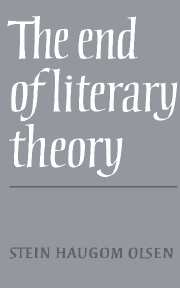Book contents
- Frontmatter
- Contents
- Preface
- Literary aesthetics and literary practice
- Interpretation and intention
- Authorial intention
- Text and meaning
- The ‘meaning’ of a literary work
- Defining a literary work
- What is poetics?
- On unilluminating criticism
- Criticism and appreciation
- Value-judgements in criticism
- Literature, fiction, and reality. A problematic relationship
- Thematic concepts: where philosophy meets literature
- Literary theory and literary aesthetics
- Notes
- Bibliography
- Index
Defining a literary work
Published online by Cambridge University Press: 05 November 2011
- Frontmatter
- Contents
- Preface
- Literary aesthetics and literary practice
- Interpretation and intention
- Authorial intention
- Text and meaning
- The ‘meaning’ of a literary work
- Defining a literary work
- What is poetics?
- On unilluminating criticism
- Criticism and appreciation
- Value-judgements in criticism
- Literature, fiction, and reality. A problematic relationship
- Thematic concepts: where philosophy meets literature
- Literary theory and literary aesthetics
- Notes
- Bibliography
- Index
Summary
ONE
The so-called revolution in philosophy, which was started by Wittgenstein and Ryle, had one important consequence for literary theory. The mentalistic view of literature, which attempted to define the literary work in terms of either the author's or the reader's mental states, was defeated. With the advent of Wittgensteinian and Rylean theories of mind it became clear that mentalistic definitions had a weakness which it was impossible to overcome: while insisting that the literary experience is logically independent of any outward manifestation (a text), they failed to explain how it is possible to identify an imaginative entity or a class of experiences as being literary in character rather than being of some other type, without referring to the text. This criticism was widely accepted, and the field was left free for other types of view to take over. Two such views became particularly influential: the anti-essentialist view and the object theory. Both these views lead the literary theorist into grave trouble from which it does not seem he can extricate himself if he stays within any of these views. I shall therefore here offer a critique of the views and briefly sketch an alternative.
The anti-essentialist argument applied in literary theory would run something like this: (1) there are no characteristics common to all literary works other than trivial ones. This is taken for granted and as shared ground. (2) Realizing this, theorists have, according to the antiessentialists, placed the real literary work, its ‘essence’, in the author's/reader's mind.
- Type
- Chapter
- Information
- The End of Literary Theory , pp. 73 - 87Publisher: Cambridge University PressPrint publication year: 1987
- 2
- Cited by



